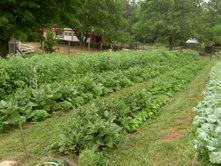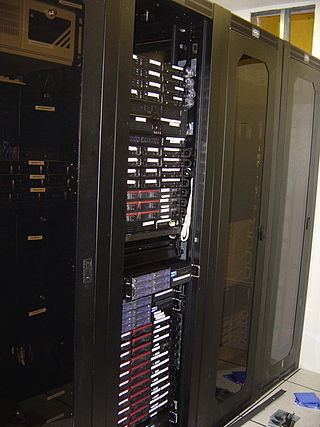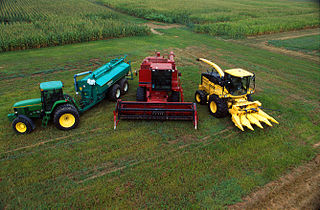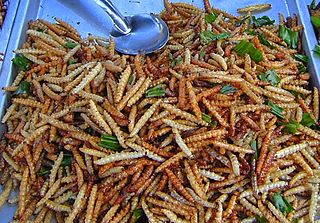A farm is an area of land or water that is primarily devoted to agricultural or aquacultural processes.
Contents
- Geography
- Types of farms
- Arts, entertainment, and media
- Computing and technology
- Other uses
- See also
Farm may also refer to:
A farm is an area of land or water that is primarily devoted to agricultural or aquacultural processes.
Farm may also refer to:

A render farm is a high-performance computer system, e.g. a computer cluster, built to render computer-generated imagery (CGI), typically for film and television visual effects.

Silicon Graphics, Inc. was an American high-performance computing manufacturer, producing computer hardware and software. Founded in Mountain View, California, in November 1981 by James Clark, its initial market was 3D graphics computer workstations, but its products, strategies and market positions developed significantly over time.
Core or cores may refer to:

A server is a computer that provides information to other computers called "clients" on computer network. This architecture is called the client–server model. Servers can provide various functionalities, often called "services", such as sharing data or resources among multiple clients or performing computations for a client. A single server can serve multiple clients, and a single client can use multiple servers. A client process may run on the same device or may connect over a network to a server on a different device. Typical servers are database servers, file servers, mail servers, print servers, web servers, game servers, and application servers.

A farm is an area of land that is devoted primarily to agricultural processes with the primary objective of producing food and other crops; it is the basic facility in food production. The name is used for specialized units such as arable farms, vegetable farms, fruit farms, dairy, pig and poultry farms, and land used for the production of natural fiber, biofuel, and other commodities. It includes ranches, feedlots, orchards, plantations and estates, smallholdings, and hobby farms, and includes the farmhouse and agricultural buildings as well as the land. In modern times, the term has been extended so as to include such industrial operations as wind farms and fish farms, both of which can operate on land or at sea.
Primary or primaries may refer to:
SSI may refer to:

Agroecosystems are the ecosystems supporting the food production systems in farms and gardens. As the name implies, at the core of an agroecosystem lies the human activity of agriculture. As such they are the basic unit of study in Agroecology, and Regenerative Agriculture using ecological approaches.

A server farm or server cluster is a collection of computer servers, usually maintained by an organization to supply server functionality far beyond the capability of a single machine. They often consist of thousands of computers which require a large amount of power to run and to keep cool. At the optimum performance level, a server farm has enormous financial and environmental costs. They often include backup servers that can take over the functions of primary servers that may fail. Server farms are typically collocated with the network switches and/or routers that enable communication between different parts of the cluster and the cluster's users. Server "farmers" typically mount computers, routers, power supplies and related electronics on 19-inch racks in a server room or data center.
Bark may refer to:
Lisa or LISA may refer to:
NonStop is a series of server computers introduced to market in 1976 by Tandem Computers Inc., beginning with the NonStop product line. It was followed by the Tandem Integrity NonStop line of lock-step fault-tolerant computers, now defunct. The original NonStop product line is currently offered by Hewlett Packard Enterprise since Hewlett-Packard Company's split in 2015. Because NonStop systems are based on an integrated hardware/software stack, Tandem and later HPE also developed the NonStop OS operating system for them.
Farming or tax-farming is a technique of financial management in which the management of a variable revenue stream is assigned by legal contract to a third party and the holder of the revenue stream receives fixed periodic rents from the contractor. It is most commonly used in public finance, where governments lease or assign the right to collect and retain the whole of the tax revenue to a private financier, who is charged with paying fixed sums into the treasury.

The College of Technology and Engineering (CTAE), is a public engineering college located in Udaipur, Rajasthan, India. It is one of the top ranking engineering institute of the state offering varied courses in engineering.

Intensive animal farming, industrial livestock production, and macro-farms, also known as factory farming, is a type of intensive agriculture, specifically an approach to animal husbandry designed to maximize production while minimizing costs. To achieve this, agribusinesses keep livestock such as cattle, poultry, and fish at high stocking densities, at large scale, and using modern machinery, biotechnology, and global trade. The main products of this industry are meat, milk and eggs for human consumption.

A computer cluster is a set of computers that work together so that they can be viewed as a single system. Unlike grid computers, computer clusters have each node set to perform the same task, controlled and scheduled by software. The newest manifestation of cluster computing is cloud computing.

Agriculture in Sudan plays an important role in that country's economy. Agriculture and livestock raising are the main sources of livelihood for most of the Sudanese population. It was estimated that, as of 2011, 80 percent of the labor force were employed in that sector, including 84 percent of the women and 64 percent of the men.
Resin is a web server and Java application server developed by Caucho Technology. Currently, only two versions are available: Resin (GPL), which is free for production use, and Resin Pro, designed for enterprise and production environments with a licensing fee. Resin supports the Java EE standard and features a mod_php/PHP-like engine called Quercus.

Agricultural machinery relates to the mechanical structures and devices used in farming or other agriculture. There are many types of such equipment, from hand tools and power tools to tractors and the farm implements that they tow or operate. Machinery is used in both organic and nonorganic farming. Especially since the advent of mechanised agriculture, agricultural machinery is an indispensable part of how the world is fed.

The welfare of farmed insects concerns treatment of insects raised for animal feed, as food or pet food, and other purposes such as honey and silk.